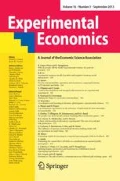Abstract
In this paper we use experimental data from rural Cameroon to quantify the effect of social distance on trust and altruism. Our measure of social distance is relevant to everyday economic interactions: subjects in a Trust Game play with fellow villagers or with someone from a different village. We find that significantly more money is sent when the players are from the same village. Other factors that influence transfers at least as much as the same-village effect are gender, education and membership of rotating credit groups. To test whether Senders are motivated by altruism, they also play a Triple Dictator Game. Senders transfer significantly more money on average in the Trust Game than in the Triple Dictator Game. However, there is also a social distance effect in the Triple Dictator Game. Results from a Risk Game suggest that Trust Game transfers are uncorrelated with attitudes to risk.
Similar content being viewed by others
References
Andreoni, J., & Miller, J. (2002). Giving according to GARP: an experimental test of the consistency of preferences for altruism. Econometrica, 70(2), 737–753.
Ashraf, N., Bohnet, I., & Piankov, N. (2006). Decomposing trust and trustworthiness. Experimental Economics, 9(3), 193–208.
Barr, A. (2003). Trust and expected trustworthiness: experimental evidence from Zimbabwe. Economic Journal, 113, 614–630.
Berg, J., Dickhaut, J., & McCabe, K. (1995). Trust, reciprocity, and social history. Games and Economic Behavior, 10(1), 122–142.
Buchan, N., & Croson, R. (2004). The boundaries of trust: own and others action in the US and China. Journal of Economic Behavior and Organization, 55, 485–504.
Buchan, N., Johnson, E., & Croson, R. (2006). Let’s get personal: an international examination of the influence of communication, culture and social distance on other regarding preferences. Journal of Economic Behavior and Organization, 60, 373–398.
Cadsby, C., Song, F., & Bi, Y. (2008). Trust, reciprocity and social distance in China: an experimental investigation. University of Guelph.
Cardenas, J., & Carpenter, J. (2008). Behavioral development economics: lessons from field labs in the developing world. Journal of Development Studies, 44(3), 311–338.
Carter, M., & Castillo, M. (2003). An experimental approach to social capital in South Africa. Department of Agriculture and Applied Economics, Staff Working Paper No. 448, University of Wisconsin.
Chaudhuri, A. (2009). Experiments in economics. London: Routledge.
Cox, J. (2004). How to identify trust and reciprocity. Games and Economic Behavior, 46(2), 260–281.
Eckel, C., & Wilson, R. K. (2004). Is trust a risky decision? Journal of Economic Behavior and Organization, 55(4), 447–465.
Etang, A., Fielding, D., & Knowles, S. (2010, forthcoming). Survey trust, experimental trust and ROSCA membership in rural Cameroon. Journal of International Development.
Fershtman, C., & Gneezy, U. (2001). Discrimination in a segmented society – an experimental approach. Quarterly Journal of Economics, 116(1), 351–377.
Fukuyama, F. (1995). Social capital and the global economy: a redrawn map of the world. Foreign Affairs, 74(5), 89–103.
Glaeser, L., Laibson, L., Scheinkman, A., & Soutter, L. (2000). Measuring trust. Quarterly Journal of Economics, 11(3), 811–846.
Goeree, J. K., McConnell, M. A., & Michell, T. (forthcoming). Linking and giving among teenage girls. American Economic Journal: Microeconomics.
Guiso, L., Sapienza, P., & Zingales, L. (2009). Cultural biases in economic exchange? Quarterly Journal of Economics, 124(3), 1095–1131.
Hoffman, E., McCabe, K., & Smith, V. L. (1996). Social distance and other-regarding preferences in Dictator Games. American Economic Review, 86(3), 653–660.
Johansson-Stenman, O., Mahmud, M., & Martinsson, P. (2006). Trust, trust games and stated trust: evidence from rural Bangladesh. Department of Economics, University of Göteborg, Working Paper No. 166.
Karlan, D. (2005). Using experimental economics to measure social capital and predict financial decisions. American Economic Review, 95(5), 1688–1699.
Kumar, K. B., & Matsusaka, J. G. (2006). Village versus market social capital: an approach to development. University of Southern California, CLEO Research Paper No. C05–5.
Leider, S., Möbius, M. M., Rosenblat, T., & Do, Q.-A. (2009). Directed altruism and enforced reciprocity in social networks. Quarterly Journal of Economics, 124(4), 1815–1851.
Long, J. S., & Freese, J. (2006). Regression models for categorical and limited dependent variables using Stata (2nd ed.). College Station: Stata Press.
Lyon, F. (2000). Trust, networks and norms: the creation of social capital in agricultural economies in Ghana. World Development, 28(4), 663–681.
Mosley, P., & Verschoor, A. (2005). The development of trust and social capital in rural Uganda: an experimental approach. Working Paper 2005/011, Department of Economics, University of Sheffield.
Netzer, R., & Sutter, M. (2009). Intercultural trust. An experiment in Austria and Japan. Working Papers in Economics and Statistics, University of Innsbruck.
Schechter, L. (2007). Traditional trust measurement and the risk confound: An experiment in rural Paraguay. Journal of Economic Behavior and Organization, 62(2), 272–292.
Tajfel, H. (1970). Experiments in intergroup discrimination. Scientific American, 223, 96–102.
Trager, L. (1981). Customers and creditors: variations in economic personalism in a Nigerian marketing system. Ethnology, 20(2), 133–146.
Walkowitz, G., Oberhammer, C., & Henning-Schmidt, H. (2003). Experimenting over a long distance – a method to facilitate intercultural experiments. University of Bonn Discussion Paper.
Willinger, M., Keser, C., Lohmann, C., & Usunier, J.-C. (2003). A comparison of trust and reciprocity between France and Germany: experimental investigation based on the Investment Game. Journal of Economic Psychology, 24(3), 447–466.
Author information
Authors and Affiliations
Corresponding author
Rights and permissions
About this article
Cite this article
Etang, A., Fielding, D. & Knowles, S. Does trust extend beyond the village? Experimental trust and social distance in Cameroon. Exp Econ 14, 15–35 (2011). https://doi.org/10.1007/s10683-010-9255-3
Received:
Accepted:
Published:
Issue Date:
DOI: https://doi.org/10.1007/s10683-010-9255-3




